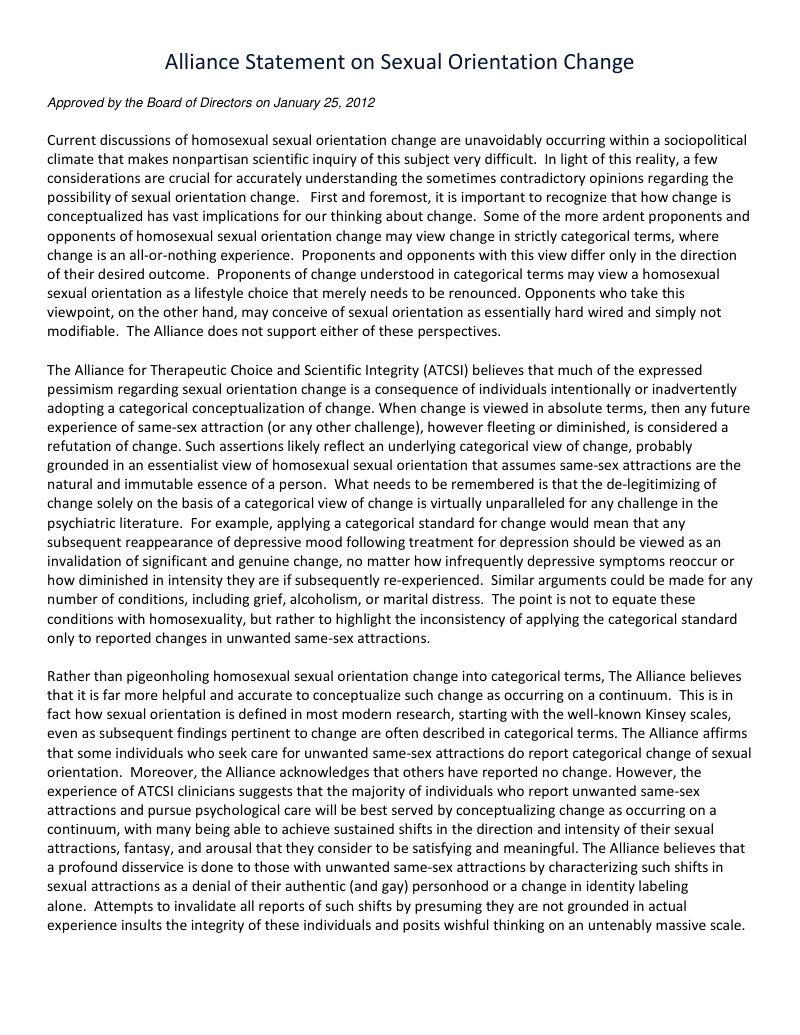The Alliance for Therapeutic Choice and Scientific Integrity (ATCSI) publishes their statement on sexual orientation change, which advocates for protection of patients rights to choose therapy.
- Type
- Website
- Source
- The Alliance for Therapeutic Choice and Scientific Integrity (ATCSI) Non-LDS
- Hearsay
- Direct
- Reference
"Alliance Statement on Sexual Orientation Change," The Alliance for Therapeutic Choice and Scientific Integrity (ATCSI), accessed November 7, 2022
- Scribe/Publisher
- The Alliance for Therapeutic Choice and Scientific Integrity (ATCSI)
- People
- The Alliance for Therapeutic Choice and Scientific Integrity (ATCSI)
- Audience
- Reading Public
- Transcription
Alliance Statement on Sexual Orientation Change
Approved by the Board of Directors on January 25, 2012
Current discussions of homosexual sexual orientation change are unavoidably occurring within a sociopolitical climate that makes nonpartisan scientific inquiry of this subject very difficult. In light of this reality, a few considerations are crucial for accurately understanding the sometimes contradictory opinions regarding the possibility of sexual orientation change. First and foremost, it is important to recognize that how change is conceptualized has vast implications for our thinking about change. Some of the more ardent proponents and opponents of homosexual sexual orientation change may view change in strictly categorical terms, where change is an all-or-nothing experience. Proponents and opponents with this view differ only in the direction of their desired outcome. Proponents of change understood in categorical terms may view a homosexual sexual orientation as a lifestyle choice that merely needs to be renounced. Opponents who take this viewpoint, on the other hand, may conceive of sexual orientation as essentially hard wired and simply not modifiable. The Alliance does not support either of these perspectives.
The Alliance for Therapeutic Choice and Scientific Integrity (ATCSI) believes that much of the expressed pessimism regarding sexual orientation change is a consequence of individuals intentionally or inadvertently adopting a categorical conceptualization of change. When change is viewed in absolute terms, then any future experience of same-sex attraction (or any other challenge), however fleeting or diminished, is considered a refutation of change. Such assertions likely reflect an underlying categorical view of change, probably grounded in an essentialist view of homosexual sexual orientation that assumes same-sex attractions are the natural and immutable essence of a person. What needs to be remembered is that the de-legitimizing of change solely on the basis of a categorical view of change is virtually unparalleled for any challenge in the psychiatric literature. For example, applying a categorical standard for change would mean that any subsequent reappearance of depressive mood following treatment for depression should be viewed as an invalidation of significant and genuine change, no matter how infrequently depressive symptoms reoccur or how diminished in intensity they are if subsequently re-experienced. Similar arguments could be made for any number of conditions, including grief, alcoholism, or marital distress. The point is not to equate these conditions with homosexuality, but rather to highlight the inconsistency of applying the categorical standard only to reported changes in unwanted same-sex attractions.
Rather than pigeonholing homosexual sexual orientation change into categorical terms, The Alliance believes that it is far more helpful and accurate to conceptualize such change as occurring on a continuum. This is in fact how sexual orientation is defined in most modern research, starting with the well-known Kinsey scales, even as subsequent findings pertinent to change are often described in categorical terms. The Alliance affirms that some individuals who seek care for unwanted same-sex attractions do report categorical change of sexual orientation. Moreover, the Alliance acknowledges that others have reported no change. However, the experience of ATCSI clinicians suggests that the majority of individuals who report unwanted same-sex attractions and pursue psychological care will be best served by conceptualizing change as occurring on a continuum, with many being able to achieve sustained shifts in the direction and intensity of their sexual attractions, fantasy, and arousal that they consider to be satisfying and meaningful. The Alliance believes that a profound disservice is done to those with unwanted same-sex attractions by characterizing such shifts in sexual attractions as a denial of their authentic (and gay) personhood or a change in identity labeling alone. Attempts to invalidate all reports of such shifts by presuming they are not grounded in actual experience insults the integrity of these individuals and posits wishful thinking on an untenably massive scale.
Finally, it also needs to be observed that reports on the potential for sexual orientation change may be unduly pessimistic based on the confounding factor of type of intervention. Most of the recent research on homosexual sexual orientation change has focused on religiously mediated outcomes which may differ significantly from outcomes derived through professional psychological care. It is not unreasonable to anticipate that the probability of change would be greater with informed psychotherapeutic care, although definitive answers to this question await further research. The Alliance remains highly interested in conducting such research, pursuant only to the acquisition of sufficient funding.
To summarize, then, those who are highly pessimistic regarding change in sexual orientation appear to have assumed a categorical view of change, which is neither in keeping with how sexual orientation has been defined in the literature nor with how change is conceptualized for nearly all other psychological challenges. The Alliance believes that viewing change as occurring on a continuum is a preferable therapeutic approach and more likely to create realistic expectancies among consumers of change-oriented intervention. With this in mind, the Alliance remains committed to protecting the rights of clients with unwanted same-sex attractions to pursue change as well as the rights of clinicians to provide such psychological care.
- BHR Staff Commentary
- Citations in Mormonr Qnas
The B. H. Roberts Foundation is not owned by, operated by, or affiliated with the Church of Jesus Christ of Latter-day Saints.

